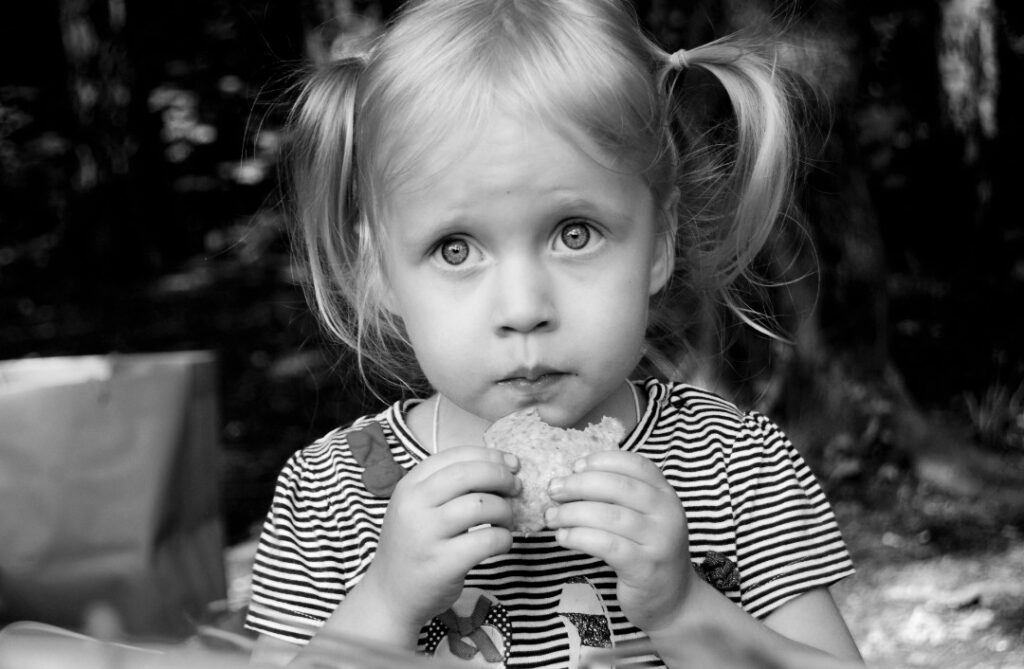If your autistic child is a messy eater then this article is for you. Below we explore why it may be the case and what you can do.
Autism and being a messy eater
One thing we have to note early is that a lot of children are messy eaters.
Pick any random five year old and give them a chocolate bar and 10% of it is probably around their mouth in seconds.
But for parents of autistic children it is often more challenging than that.
Regularly it seems like our autistic children have no concept of cleanliness at all.
Why could that be?
Let us explore some possible reasons.
Poor motor skills
Fine motor skills can take longer to develop in some autistic children.
This can wind up making it challenging to coordinate hands and utensils effectively. This can lead to spills and dropped food.

Sensory factors
Autistic children can have strong and sometimes unique sensory experiences.
Certain textures, temperatures, or tastes of food might be unpleasant or overwhelming for them, leading to fussiness or difficulty manipulating utensils.
Turning this theory into a reality, sometimes autistic kids don’t like using spoons.
If that is the case then it is no wonder that when given a bowl of ice cream then messiness is just around the corner.
Focus
Autistic children might be easily distracted during mealtimes, particularly if there are loud noises or other inputs present.
This can make it difficult for them to concentrate on eating neatly.
Or it might be that they have a special interest like trains or toys and simply they can’t concentrate on eating.
Communication
Sometimes, autistic children might have difficulty expressing their needs or preferences related to food.
This can lead to frustration and messy eating if their needs aren’t met or understood.
Picture for example that you were an autistic child and struggling to use a utensil.
Then when you wanted to explain this to a parent you couldn’t.
Naturally this may lead to you taking matters into your own hands, literally.
Lack of social awareness
Someone with poor social awareness might not grasp the impact their messy eating can cause others.
They might leave splatters on shared tables, drop food on the floor, or loudly slurp their drinks without realising it’s considered impolite.
The same applies for them having food around their faces or on their hands. An autistic child may not even grasp that it is a social faux par.
This could expand to the point that they don’t recognise social cues from other people.
For example often if someone has food around their mouth, other diners may subconsciously wipe their own mouth.
An autistic child may not pick up on such a non spoken clue.
What can parents do if their autistic child is a messy eater?
Whilst every child is different, here are some tactics to consider;
Try different utensils
Your child may be struggling due to poor motor skills or sensory sensitivities.
With that being the case you can try a period of trial and error with different utensils. Consider easy grip forks or plastic knives.
Lead by example
It is likely that everyone reading this article has good table manners.
But it may be helpful to demonstrate repeatedly what you do if you get food around your face.
Consider having the same meal as your child and then ‘accidently’ smearing it on your face.
From there you can make a point of getting a napkin and ensuring you clean yourself.
Reward good efforts
If your child makes the effort to clean their face then even if it isn’t successful, be sure to praise them.
Just a simple well done (then finishing the job) will reassure your child that their efforts are noted.
Choose ‘clean’ foods
Autistic children often have a limited diet, but if possible you can try and steer away from messy meals.
Typically dry meals are more ‘face friendly’ but a period of trial and error may be required.
Summary – Autistic child who is a messy eater
Messy eating can be a common challenge for autistic children for a variety of reasons, often linked to their unique sensory and developmental experiences.
Through trial and error and with a lot of patience parents can help their child improve in this area.
Good luck

